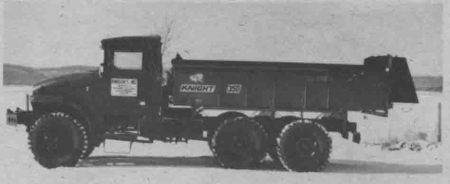
"We were very interested in your recent FARM SHOW story (Vol. 8, No. 2), on Ray Heilman's 'military' grain truck in Toppenish, Wash. We, too, have one of these GMC 6-WD military trucks, which we have converted to a self-propelled manure spreader," reports Verne Kindschi, Prairie Du Sac, Wis.
"We found one that had body, frame and gearing in perfect condition and were able to purchase it for junk. Although built in 1952, it had only 27,000 miles on it. However, the automatic transmission was burned out and the engine was in need of repair.
"Transmissions and engines for these trucks are available but they are quite expensive and, as the article on Heilman's truck pointed out, the automatic transmissions leave much to be desired. Even when they were new, these transmissions did not hold up well, as I found out serving in the army as a mechanic in 1955. So, we decided to put in a 5-speed manual transmission. We also replaced the original 306 cu. in., 6-cyl. GMC military engine with a 304 cu. in., V-8 International engine.
"The
project took a lot more time and work than we anticipated but we were able to complete all the work in our own farm shop. Knight Manufacturing Co., Brodhead,
Wis., then mounted a new 350 bu. Knight spreader on the truck.
"We have used this self-propelled spreader for three years and it has worked out very well. Instead of having to spread all our manure on our two home farms, where our feedlots are located, we can now haul manure to more distant locations and thus get more value out of it.
"There are two improvements I'd like to make in our rig. We are a little short of power and should have put in a 345 cu. in. engine instead of the 304. Also, I wish now we'd cut the frame and extended the wheel base another 18 in. because, when the spreader is loaded, the front end gets quite light. If we had hilly land we would have a problem.
"I believe 6-WD is a must for spreading manure. During the three years we have used the truck, it has only been stuck a couple times -- much less than our tractors and spreaders."
